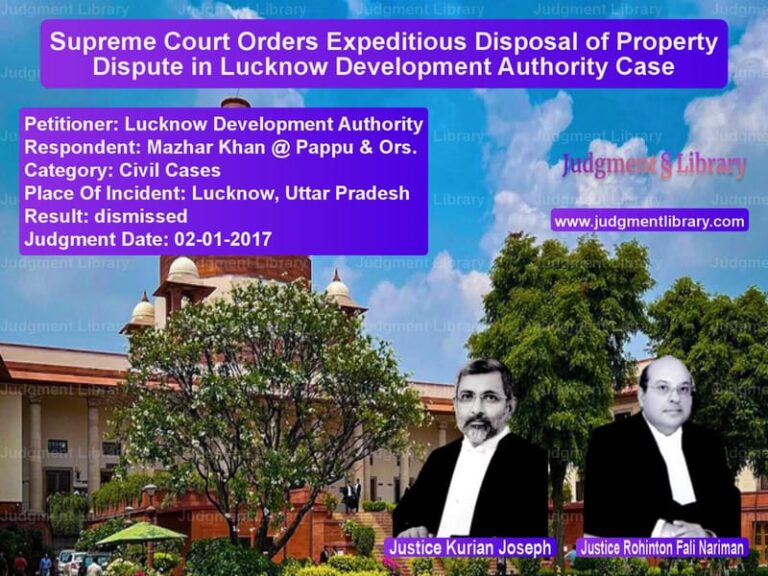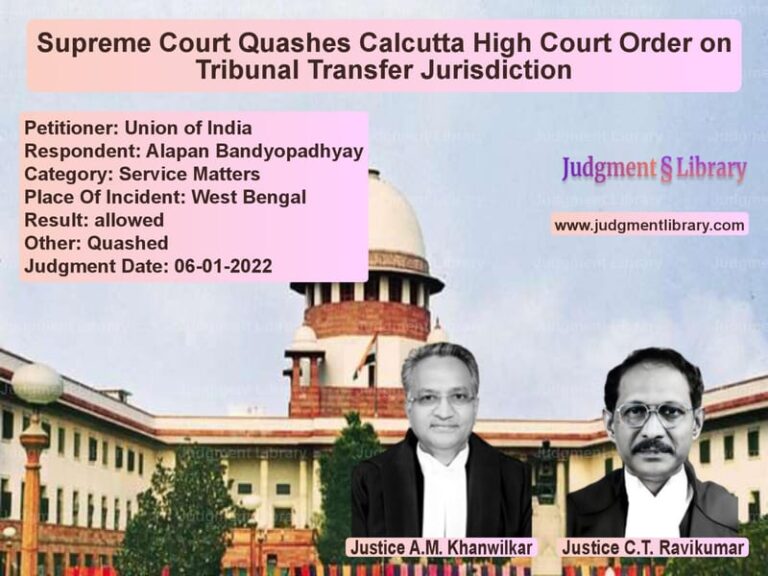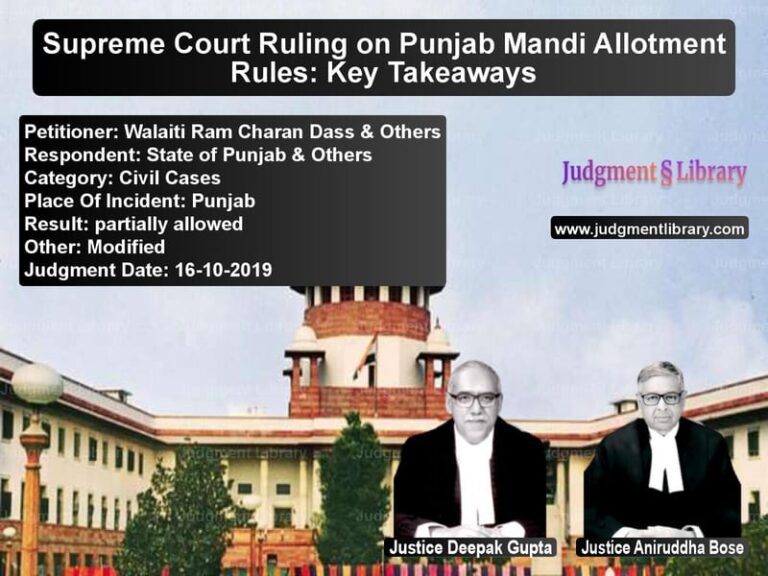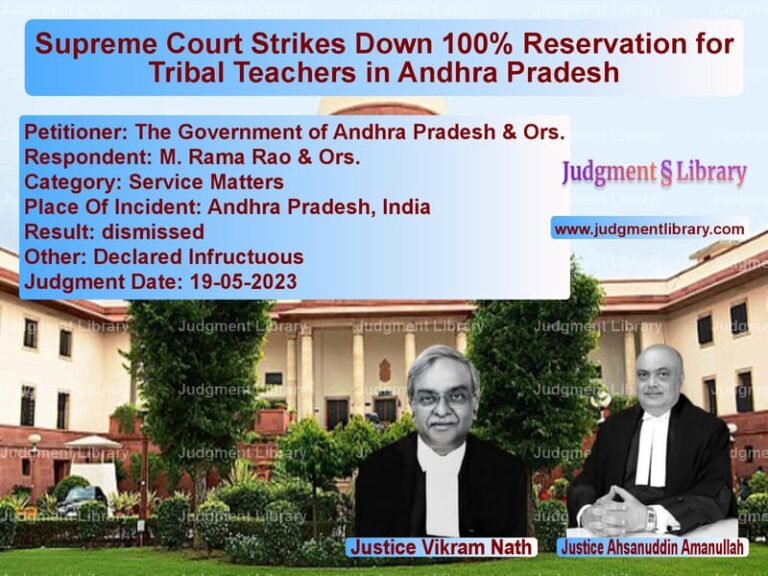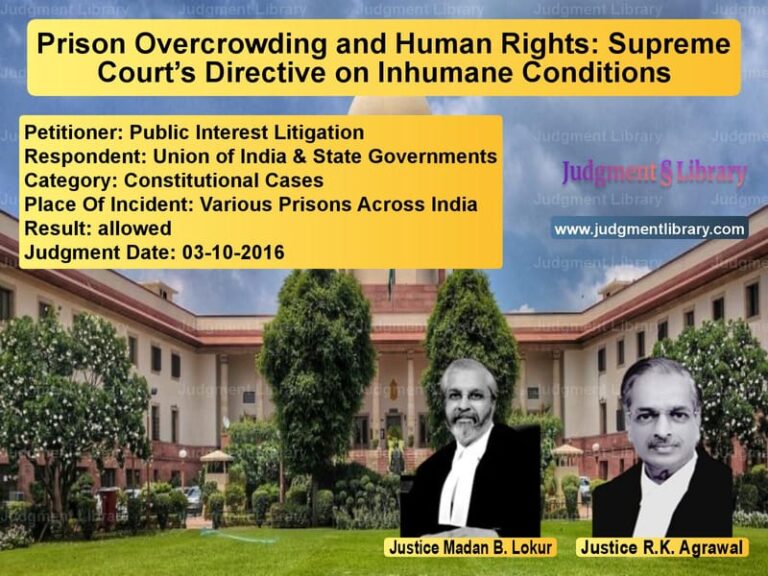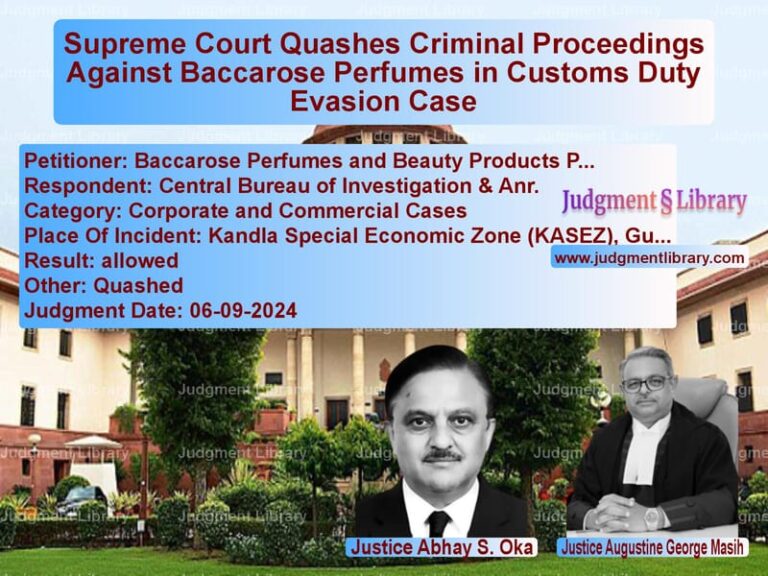Land Acquisition Case: Supreme Court Rules on Deemed Lapse Under Section 24(2) of Land Act
The Supreme Court of India recently ruled in the case of Govt. of NCT Delhi & Anr. v. Dinesh Kumar & Anr., where the main issue was whether the acquisition of land could be deemed to have lapsed under Section 24(2) of the Right to Fair Compensation and Transparency in Land Acquisition, Rehabilitation and Resettlement Act, 2013 (referred to as the Act, 2013). The Court set aside the Delhi High Court’s judgment, which had declared the land acquisition as lapsed due to non-payment of compensation.
The Supreme Court, relying on its landmark ruling in Indore Development Authority v. Manoharlal, held that for an acquisition to lapse under Section 24(2), two conditions must be met:
- Possession must not have been taken.
- Compensation must not have been paid.
Since possession had been taken in this case, the acquisition could not be deemed to have lapsed, even if compensation was not paid.
Background of the Case
The dispute arose when the Government of NCT of Delhi initiated land acquisition proceedings and took possession of the disputed land on December 31, 2013. The Act, 2013 came into force the next day, on January 1, 2014. The original landowners claimed that since they had not received compensation, the acquisition should be considered as lapsed under Section 24(2) of the Act.
Arguments Before the Supreme Court
Arguments by the Government of NCT of Delhi
The government, represented by its counsel, argued that:
- Possession of the land was taken on December 31, 2013, before the Act, 2013 came into force.
- The possession was taken legally by drawing a ‘punchnama,’ a legally recognized method of recording land possession.
- As per the Supreme Court’s ruling in Indore Development Authority, non-payment of compensation alone does not lead to a deemed lapse of acquisition.
Arguments by the Landowners
The original landowners, represented by their counsel, contended that:
- The possession taken by the government was only ‘paper possession’ and not actual physical possession.
- Since compensation was not paid, one of the conditions of Section 24(2) was satisfied, leading to a deemed lapse.
Supreme Court’s Observations and Ruling
Possession Taken Before the Act, 2013
The Supreme Court analyzed the evidence and found that possession was taken on December 31, 2013, before the Act, 2013 became effective. The Court held that:
“The date on which the Act, 2013 came into force, the possession was already taken over.”
Since possession had been taken, the first condition for a deemed lapse under Section 24(2) was not met.
Rejection of the ‘Paper Possession’ Argument
The Court rejected the argument that only a ‘paper possession’ was taken, stating:
“The possession of the land in question is taken over by drawing the punchnama, which is held to be a legal mode of taking possession as per the decision of this Court in the case of Indore Development Authority.”
Clarification on Section 24(2) of the Act, 2013
The Supreme Court reaffirmed its position in Indore Development Authority v. Manoharlal, where it held that both conditions—non-possession and non-payment of compensation—must be satisfied for an acquisition to lapse. The Court stated:
“For deemed lapse under Section 24(2) of the Act, 2013, twin conditions of not taking possession and not tendering/paying the compensation are required to be satisfied. If one of the two ingredients of Section 24(2) of the Act, 2013 is not met, there shall not be any deemed lapse of acquisition.”
Final Judgment
The Supreme Court ruled that since possession had been taken before the Act, 2013 came into effect, the acquisition could not be deemed to have lapsed. Accordingly, it set aside the Delhi High Court’s judgment and restored the land acquisition.
Key Takeaways from the Judgment:
- For an acquisition to lapse under Section 24(2), both possession and compensation conditions must be unmet.
- Taking possession through legal procedures such as a ‘punchnama’ is valid and sufficient.
- Non-payment of compensation alone does not automatically result in the lapse of acquisition.
- The Supreme Court’s ruling in Indore Development Authority continues to be the binding precedent for such cases.
Impact of the Judgment
This ruling has significant implications for land acquisition cases across India. It ensures that:
- The government can retain land acquired legally even if compensation is pending.
- Landowners cannot challenge acquisitions solely on the ground of unpaid compensation if possession has been taken.
- The interpretation of Section 24(2) remains consistent with the Supreme Court’s earlier ruling in Indore Development Authority.
This decision strengthens the position of acquiring authorities while also providing clarity to landowners on the conditions required for a deemed lapse under the Act, 2013.
Petitioner Name: Govt. of NCT Delhi & Anr..Respondent Name: Dinesh Kumar & Anr..Judgment By: Justice M.R. Shah, Justice C.T. Ravikumar.Place Of Incident: New Delhi.Judgment Date: 28-04-2023.
Don’t miss out on the full details! Download the complete judgment in PDF format below and gain valuable insights instantly!
Download Judgment: govt.-of-nct-delhi-&-vs-dinesh-kumar-&-anr.-supreme-court-of-india-judgment-dated-28-04-2023.pdf
Directly Download Judgment: Directly download this Judgment
See all petitions in Property Disputes
See all petitions in Landlord-Tenant Disputes
See all petitions in Judgment by Mukeshkumar Rasikbhai Shah
See all petitions in Judgment by C.T. Ravikumar
See all petitions in allowed
See all petitions in Quashed
See all petitions in supreme court of India judgments April 2023
See all petitions in 2023 judgments
See all posts in Civil Cases Category
See all allowed petitions in Civil Cases Category
See all Dismissed petitions in Civil Cases Category
See all partially allowed petitions in Civil Cases Category


